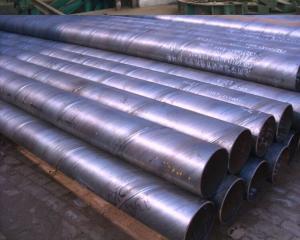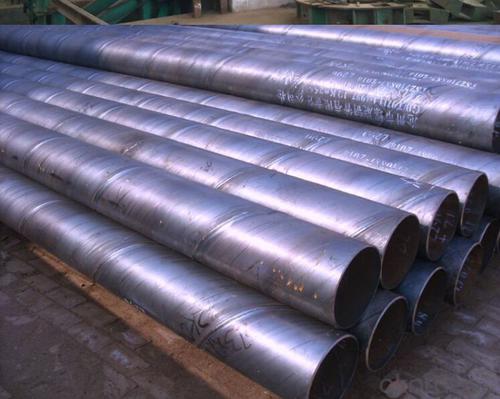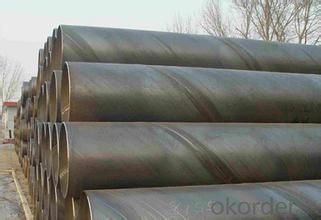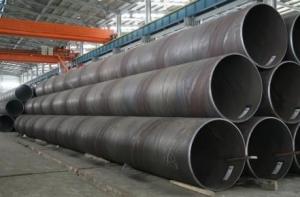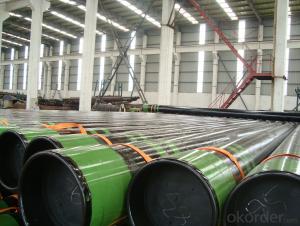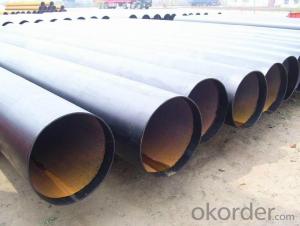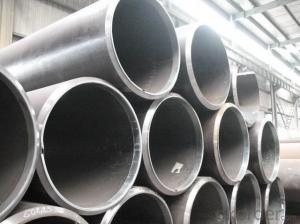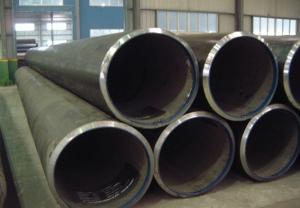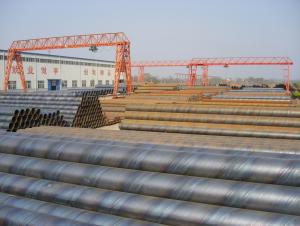SSAW Steel Pipes 2
- Loading Port:
- China Main Port
- Payment Terms:
- TT or LC
- Min Order Qty:
- -
- Supply Capability:
- -
OKorder Service Pledge
OKorder Financial Service
You Might Also Like
Quick Details
| Thickness: | 6 - 28 mm | Section Shape: | Round | Outer Diameter: | 219 - 3500 mm |
Place of Origin: | Tianjin (Mainland) | Secondary Or Not: | Non-secondary | Application: | Oil Pipe |
| Technique: | SAW | Certification: | API | Surface Treatment: | as per your request,Black/Blue 3PE or as per your request |
Special Pipe: | API Pipe | Alloy Or Not: | Non-alloy | ||
| Certificate: | ISO 9001:2008, API, SGS, BV | Material: | Q235A/B,Q345,L360 and X42-X80 grade | Package: | In bulk or bundles |
| Usage: | structure pipe | Main market: | all over the world | Product name: | SSAW Spiral Steel Tube |
| End: | Beveled End |
FAQ of SSAW Steel Pipes:
①How is the quality of your products?
Our products are manufactured strictly according to national and internaional standard, and we take a test on every pipe before delivered out. If you want see our quality certifications and all kinds of testing report, please just ask us for it.
Guaranteed: If products’ quality don’t accord to discription as we give or the promise before you place order, we promise 100% refund.
②How about price?
Yes, we are factory and be able to give you lowest price below market one, and we have a policy that “ for saving time and absolutely honest business attitude, we quote as lowest as possible for any customer, and discount can be given according to quantity”,if you like bargain and factory price is not low enough as you think, just don’t waste your time.Please trust the quotation we would give you, it is professional one.
③Why should you chose us?
Chose happens because of quality, then price, We can give you both.Additionally, we can also offer professional products inquiry, products knowledge train(for agents), smooth goods delivery, exellent customer solution proposals.Our service formula: good quality+good price+good service=customer’s trust
SGS test is available, customer inspection before shipping is welcome, third party inspection is no problem.
Any question, pls feel free to contact us !
SSAW Steel Pipes Images:
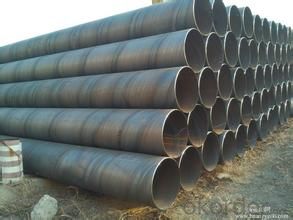
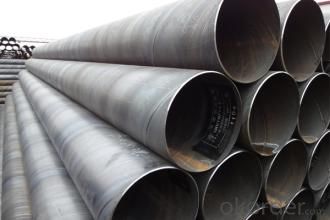
- Q: Are steel pipes affected by UV rays?
- Yes, steel pipes can be affected by UV rays. Exposure to UV rays can cause the steel to degrade and corrode over time. Therefore, it is important to protect steel pipes from direct sunlight and UV radiation to prolong their lifespan and maintain their structural integrity.
- Q: What is the difference between steel pipes and copper-nickel pipes?
- Steel pipes and copper-nickel pipes differ in material composition and properties. Steel pipes are primarily made from iron and carbon, which provide strength and durability. They are suitable for various applications, including plumbing, construction, and industrial purposes. On the other hand, copper-nickel pipes are composed of a combination of copper and nickel, which offer excellent corrosion resistance and thermal conductivity. These pipes are often used in marine environments, desalination plants, and offshore oil and gas industries due to their ability to withstand saltwater corrosion. Overall, the main distinction lies in their composition and specific applications based on their unique properties.
- Q: How are steel pipes used in the manufacturing sector?
- Steel pipes are commonly used in the manufacturing sector for various purposes, such as transporting fluids and gases, providing structural support, and facilitating the flow of materials in manufacturing processes. They are used in industries like construction, oil and gas, automotive, and aerospace for applications such as pipelines, machinery, conveyors, and infrastructure. Steel pipes offer durability, strength, and resistance to corrosion, making them an ideal choice for many manufacturing needs.
- Q: What is the elasticity of steel pipes?
- The elasticity of steel pipes refers to their ability to deform under stress and then return to their original shape once the stress is removed. Steel pipes are known for their high elasticity, which allows them to withstand heavy loads and pressure without permanent deformation.
- Q: How do steel pipes perform in extreme temperature variations?
- Steel pipes perform well in extreme temperature variations due to their high thermal conductivity and resistance to expansion and contraction. They are able to withstand both high and low temperatures without losing their structural integrity or experiencing significant changes in dimensions. This makes steel pipes suitable for a wide range of applications, including those in industries with extreme temperature conditions, such as oil and gas, chemical processing, and power generation.
- Q: How do steel pipes compare to other materials like PVC or copper?
- Steel pipes are known for their exceptional strength and durability, making them suitable for various applications. Compared to materials like PVC or copper, steel pipes offer higher resistance to corrosion, fire, and extreme temperatures. They also have a longer lifespan and can withstand high pressure and heavy loads. However, steel pipes are generally more expensive and require regular maintenance to prevent rusting. PVC pipes, on the other hand, are more affordable, lightweight, and easy to install, but they are less durable and have lower temperature resistance. Copper pipes are known for their excellent heat conductivity and resistance to corrosion, but they are more expensive and can be prone to theft. Ultimately, the choice between steel, PVC, or copper pipes depends on the specific requirements of the project and the budget.
- Q: How do steel pipes handle seismic expansion joints?
- Steel pipes handle seismic expansion joints by incorporating flexible joints or bellows in the pipeline system. These flexible joints are designed to absorb and accommodate the movement caused by seismic activity, allowing the steel pipes to expand and contract without causing damage or failure to the overall pipeline system.
- Q: How are steel pipes protected against microbial corrosion?
- Steel pipes are protected against microbial corrosion through various methods, such as applying protective coatings or linings on the pipes' inner and outer surfaces. These coatings act as a barrier, preventing the contact of microorganisms with the steel surface, thereby reducing the risk of microbial corrosion. Additionally, biocides and inhibitors can be added to the pipe's contents or injected into the pipeline to inhibit the growth and activity of microbes, further protecting the steel pipes from microbial corrosion.
- Q: What is the cost of steel pipes compared to other piping materials?
- The cost of steel pipes can vary depending on factors such as size, thickness, and grade. However, generally speaking, steel pipes tend to be more expensive than other piping materials such as PVC or copper. This is due to the durability, strength, and longevity of steel pipes, making them a preferred choice for various industrial and construction applications.
- Q: How do you calculate the weight of a steel pipe?
- To calculate the weight of a steel pipe, you need to know its outer diameter, wall thickness, and length. First, calculate the cross-sectional area of the pipe by subtracting the inner diameter from the outer diameter and multiplying it by π. Then, multiply the cross-sectional area by the wall thickness and length of the pipe to find its volume. Finally, multiply the volume by the density of steel to calculate the weight of the steel pipe.
Send your message to us
SSAW Steel Pipes 2
- Loading Port:
- China Main Port
- Payment Terms:
- TT or LC
- Min Order Qty:
- -
- Supply Capability:
- -
OKorder Service Pledge
OKorder Financial Service
Similar products
Hot products
Hot Searches
Related keywords
